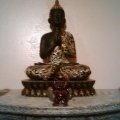Some understanding from koans
Hi All,
I was reading the pdf file of The True Dharma Eye - Zen Master Dōgen’s 300 koans with commentary and verse by John Daido Loori and translated by Kazuaki Tanahashi and John Daido Loori. In this pdf file, the 17th koan is below:
Zen master Zhixian of Mount Xiangyan [Xideng] was bright in nature. Being at the assembly of Guishan, he was well learned and had extensive memory.
Guishan one day said to Xiangyan, “Everything you say is what you’ve memorized from commentaries. Now I am going to ask you a question. When you were an infant—before you could even distinguish east from west—at that time, how was it?”
Xiangyan spoke and presented his understanding, explaining the principle, but could not get approval. He went through the texts he had collected and studied, but he could not find an answer that would satisfy the master.
Deeply grieved and in tears, he burned all his books and commentaries. Then he said to himself, “I will never understand Zen in this lifetime. I will become a hermit monastic and enter a mountain and practice.”
Thus he entered Mount Wudang and built a hut near the grave site of National Teacher Nanyang. One day while he was sweeping the path, a pebble struck a stalk of bamboo and made a cracking sound. At that moment he suddenly had a great enlightenment experience. He wrote a poem expressing his understanding:
"One crack and all knowledge has dissolved.
The struggle is over.
I follow the ancient Way, not lapsing into doubt.
Dignified bearing and conduct
that is beyond sound and form;
no trace remains of my passing.
Those who have mastered the Way
call this the unsurpassable activity."
He presented this poem to Guishan, who said, “This fellow has penetrated it completely.”
I cannot become a monk, since I have a family and I have a contract job through which I earn money to take care of my family, but in whatever little time I get, if I remember to sit in zazen, then I can try to sit in zazen for that little time. I think it all comes down to suchness - just thisness of the present moment, which is just what is happening in here and now. That is why in Zen I think it is said when sit, just sit. When walk, just walk.



Comments
Jundo at Treeleaf is a householder
http://www.treeleaf.org/teachers/
You might also find other companions, pebbles, books to burn, crying questions/answers etc
I practice and teach Aikido. There's a saying ... "If you think you're relaxed, you're not." The Zen corollary is ... "If you think you understand, you don't." But you can awaken to both (relaxing and understanding) - and you don't have to be a martial artist or a monk to do so. And when you arrive, there will be no doubt.
tee hee
I think aikido and zen must be related to quantum mechanics ...
“If you think you understand quantum mechanics then you don't understand quantum mechanics”
Richard Feynman
https://zengut.com/tag/quantum-mechanics/